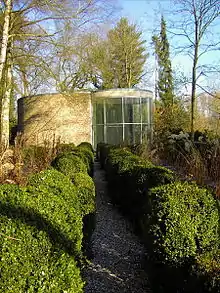Erwin Heerich
Erwin Heerich (29 November 1922 in Kassel – 6 November 2004 in Meerbusch, Germany) was a German artist.
Life and work

From 1945 to 1950 Heerich studied fine arts at the Kunstakademie Düsseldorf under Ewald Mataré.[1] From 1950 to 1954, he belonged, together with Joseph Beuys, to the master class of his professor. At that time, he chiefly produced sculptures representing animals and drawings of plants. In 1954, he left the Düsseldorf academy and worked as an artist and art teacher. Since 1959, he used cardboard as his artistic material. He presented 10 of these "Kartonplastiken" at the documenta IV (1968) in Kassel.
Heerich emphasized that for him, "cardboard, like polystyrene, had no specifically aesthetic or historical connotations, the materials are value-neutral to the largest possible extent." Furthermore, the artist was not primarily "concerned with the manifestation of an art object, but with making an idea material in terms of a specific problem: how space can be presented and formed."[2]
From 1969 to 1988 he was a professor at the Kunstakademie Düsseldorf.[3] In 1974 he became also a member of the Academy of Arts, Berlin.
From 1982 to 1994 he created eleven exhibition pavilions for the Museum Insel Hombroich, which were called "chapels in the landscape".[4] His elemental sculptures became the design base for these gallery pavilions.[5]
In 1978 Heerich received the Will Grohmann Prize in Berlin. In 1987 he received the Max Beckmann Prize in Frankfurt am Main and in 1995 the Anton Stankowski Prize in Stuttgart.[6]
References
- Invar Hollaus, "Heerich, Erwin". In Allgemeines Künstler-Lexikon, vol. 71 (2011), p. 44.
- "Erwin Heerich". arnews.org.
- "Erwin Heerich". kunstakademie-duesseldorf.be.
- Udo Weilacher, In Gardens: Profiles of Contemporary European Landscape Architecture (Basel: Birkhäuser, 2005), p. 76.
- Christel Blömeke, Museum Insel Hombroich: Die begehbaren Skulpturen Erwin Heerichs (2009).
- Hollaus, p. 44.
Further reading
- Hans van der Grinten, Erwin Heerich: Plastische Modelle und Diagrammzeichnungen. Berlin 1983.
- Franz Joseph van der Grinten, "Erwin Heerich – Plastische Form und Denkmodell", Das Kunstwerk, volume 37, 1984, no. 4, pp. 15–25.
- Joachim Peter Kastner, Erwin Heerich. Cologne 1991.
- Heinz-Norbert Jocks, "Das Maßliche – zum 70. Geburtstag des Bildhauers Erwin Heerich". In Düsseldorfer Hefte, No. 22, November 1, 1992, pp. 16 – 21.
- Christoph Brockhaus, Erwin Heerich: Plastische Prozesse. Wilhelm-Lehmbruck-Museum, Duisburg, Europäisches Zentrum moderner Skulptur, 1992.
- Christoph Brockhaus, ed., Trikona : Wilhelm-Lehmbruck-Museum Duisburg 1994: Erwin Heerich, Katsuhito Nishikawa. Duisburg 1994.
- Wolfgang Schepers, Kunst + Design : Erwin Heerich: Plastische Modelle für Architektur und Skulptur. Kunstmuseum Düsseldorf 1995.
- Erwin Heerich, Die Entwicklung architektonischer Skulpturen. Cologne 1999.
- Margot Klütsch, Erwin Heerich: Werke in Meerbusch: Skulpturen, Modelle, Papierarbeiten (2005).
- Kerstin Walter, Das Pittoreske: Die Theorie des englischen Landschaftsgartens als Baustein zum Verständnis von Kunst der Gegenwart. Worms 2006.
External links
 Media related to Category:Erwin Heerich at Wikimedia Commons
Media related to Category:Erwin Heerich at Wikimedia Commons- Museumsplattform NRW: Erwin Heerich
- artnews.org
- artslant.com